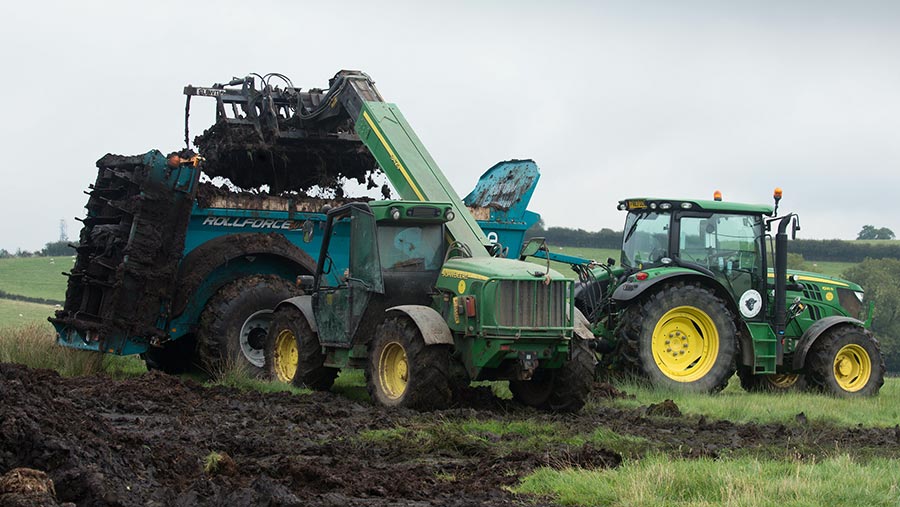Reprieve for autumn muckspreading as fertiliser prices bite
 © Tim Scrivener
© Tim Scrivener Changes to the rules around autumn muckspreading and a reprieve for urea application are included in a raft of measures from Defra to help English farmers cope with the sharp increases in fertiliser prices.
Other steps will include grants to help farmers store more slurry, funding to encourage the growing of nitrogen-fixing crops, and support for the development of new organic-based fertilisers.
See also: FW Opinion – Don’t jump the gun with an unfair solid urea ban
“The significant rise in the cost of fertiliser is a reminder that we need to reduce our dependence on manufacturing processes dependent on gas,” said Defra secretary George Eustice.
“Many of the challenges we face in agriculture will require a fusion of new technology with conventional principles of good farm husbandry.
“The measures we have announced today are not the whole solution, but will help farmers manage their nitrogen needs in the year ahead.”
No ban on urea
Announcing the government’s response to last year’s consultation on the use of urea, which had pointed to an outright ban in an attempt to reduce ammonia emissions from agriculture, Defra said any changes would be delayed at least a year “to help farmers manage their costs and give them more time to adapt”.
When restrictions are introduced in April next year, they will be incorporated into a new Red Tractor standard which will allow the use of untreated/unprotected urea fertilisers between 15 January and 31 March.
Any further applications during the rest of the year will require the use of ammonia inhibitors on the urea.
Farming Rules for Water
In a move to further support farmers, revised and improved statutory guidance has been agreed on how farmers should limit the use of slurry and other farmyard manure at certain times of year.
“This will clarify that the government does not intend to ban autumn manure spreading through the Farming Rules for Water, but clarifies the conditions when it is not appropriate for the Environment Agency to sanction farmers when they spread manure in the autumn and winter months,” the Defra statement said. Further details are still awaited.
Grants to help farmers store and cover up to six months’ worth of slurry will also be provided, but rates will not be announced until later in the year.
This will help reduce dependence on artificial fertilisers by storing organic nutrients until needed or for onward processing, Defra says.
Sustainable Farming Incentive
Further details of the Sustainable Farming Incentive (SFI) have also been published (see panel below).
“Given current fertiliser prices, the priority must be to pioneer new technologies to manufacture more organic-based fertiliser products, and rediscover techniques such as using nitrogen fixing legumes and clovers as an alternative to fertiliser,” the Defra statement said.
The government will pay farmers to help them with the costs of sowing nitrogen-fixing plants and green manures to substitute some of their fertiliser requirements for the coming season.
Other measures
An industry fertiliser roundtable will also meet this week, chaired by the Defra farming minister, Victoria Prentis, to better understand the impact of current pressures on farmers.
And a further £20.5m is being put into the Farming Innovation Programme, to fund research into “climate-smart farming” and collaborative projects to boost productivity.
Reaction
Responding to the announcement, Country Land and Business Association president Mark Tufnell pointed to the “sheer scale of the challenges ahead in the UK’s food production”.
“The exceptionally high price of fertiliser can be mitigated only to a degree by high commodity prices,” he said.
“Some farmers may choose not to spread fertiliser at all this year.
“But if prices continue to stay at this all-time high, then government will need to urgently consider ways of increasing and diversifying domestic fertiliser production.”
Soil Association farming director Liz Bowles also welcomed Defra’s attempts to reduce reliance on artificial nitrogen fertiliser.
“It’s vital that we act differently to our post-war response in the 1940s by prioritising climate and nature alongside food security,” she said.
“The ongoing damage being done to soils, wildlife and climate poses the biggest threat to food security, and nature-friendly, agroecological farming provides the best path to ensuring long-term resilience.”
Sustainable Farming Incentive 2022 – rates confirmed |
||
|
Standard |
Level |
Total annual payment |
|
Arable and horticultural soils |
Introductory |
£22/ha |
|
Intermediate |
£40/ha |
|
|
Improved grassland soils |
Introductory |
£28/ha |
|
Intermediate |
£58/ha |
|
|
Moorland |
Introductory |
£10.30/ha |
|
Additional payment |
£265 per agreement |
|
Further updates:
- Farmers can apply for SFI from the summer onwards – there is no fixed application window.
- Tenants on short-term rolling tenancy agreements can enter SFI, provided they expect to have management control for at least three years.
- The online application system has been simplified to make it faster and easier for farmers to apply.
